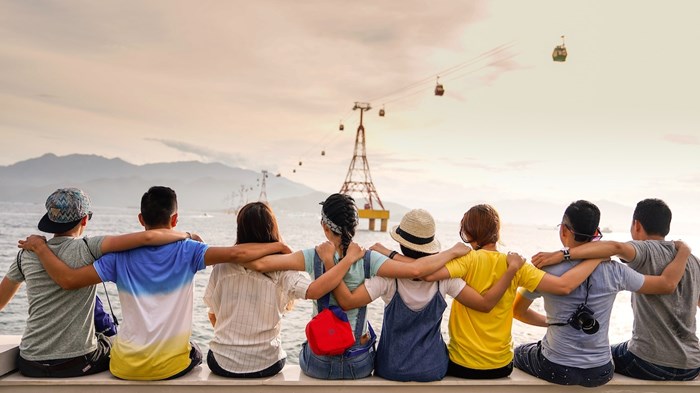COVID in Australia: Are Humans Made to Isolate Themselves?

We are all in the boat together. Kevin Giles writes from Australia
Who in Australia could have imagined in late February 2020 that Qantas would ground all its planes and stand down 20,000 staff, Myers, would close all of its stores and put off 10,000 staff, by the end of March over one million Australians would be unemployed, the government would be subsidising all wages up to $1500 a month, 9.5 million families would be confined to their home, most children would not be going to school, toilet paper and pasta would be very scarce in supermarkets, retired people with super funds may have lost up to 10% the value of their investments, and all churches would be closed. On Easter day this year there will be a more muted triumphant communal exclamation, “He is Risen.”
In this critical hour our national leaders are telling us the most import thing we can do to stop the spread of Covid-19 is, “Isolate yourself.” Do not leave your home except to exercise on your own, go to the supermarket on your own, or visit your doctor if you must, and if you can, work at home and study at home. Keep 1.5 metres between you and anyone else. This regime, our leaders tell us, will last for at least 6 months, possibly longer. It is “the new normal.” This crisis will not end until a vaccine is developed, and most think this will take about 18 months.
Our leaders must make these rules if large numbers of lives are to be spared so that in the long term we can return to near full employment and prosperity, if we ever get back to the way we were. Mr Morrison, our Prime Minister, at this time has the hardest job possible. We should be praying for him and his team.
Isolate yourself.
Do not mix with others outside of your home is the primary message. If you must go out keep your distance. Any contact you have with someone else - make it brief. The problem is we humans are social beings. Our health is as dependent on social interaction as it is on food. Isolation can be lethal. A sentence of solitary confinement is the worst punishment you can inflict on a human being. For this reason, not surprisingly, some of us are not keeping to the rules we have been asked to obey and are freely mixing with others. We have been told the 20 to 30-year olds are the worst offenders, but it seems to me as an oldie that my age group is not far behind. The blame game takes us nowhere; what is important is the question, “Can we keep up this isolation for 6 months to a year?” It certainly is going to be challenging and costly.

Now I want to address specifically this issue for those of us who identify as Christians. The Christian religion is a communal religion. Jesus called twelve disciples, whom he called “apostles,” to be his companions on the way. We now recognise that they were proto church, the beginning of the Christian community. When the risen Jesus sent out the Twelve Apostles, after Easter to preach the Gospel, they immediately had their converts meeting together, usually at first in larger homes. They called these gatherings, “churches.” This English word translates the Greek word ekklesia, and so we get the English word “ecclesiastical” to refer to churchy matters. The Greek word is best translated, “community.” The word speaks of those who have a common identity as followers of Christ and in specific locations have a common life together. So, the Epistle of Hebrews, says, “Do not neglect to meet together” (Heb 10:25). Christian theologians differ on many matters but none would reject this admonition. I have been told a thousand times, “You can be a good Christian and not go to church,” which in exceptional situations is true, but as a general rule it is not. We need to gather with other Christians to keep faith and hope alive and to encourage one another. This is the very thing – well at least as we have done - we cannot do for at least 6 months.
Yes, we must “isolate ourselves” but the cost of doing this is not only economic. It will impact also on both our physical and mental health and put huge strain on many families and marriages. And for Christians specifically - my concern - it will make keeping faith and hope alive in this unbelieving world more difficult than ever.
What we must do.
For our general well-being and mental health we must keep in contact with others, and for our spiritual health this is also true. And the one piece of good news is that we can do this in 2020 better than has ever been possible. Almost all homes now have access to the National Broadband Cable (NBN) that gives high speed access to the World Wide Web. On this we can connect with others face to face on Skype, Zoom, Facetime and half a dozen other platforms. We can thus speak, see and join in conferences with those with whom we work, catch up with our extended families and friends - best of all or grandchildren if we are so blessed. What is more we can have church in the home. Our church is using Zoom as are many other churches. On Sunday mornings we join in worship with all our community and during the week with the dozen or so we “meet” with our home group.
Yes, I am aware that many older Australians, including many church goers are not on the internet. We are told that up to 20% of homes don’t have internet connection. Their families and friends will thus need to use the old-fashioned hard-line phone to keep in contact with them and the pastoral team in churches will need to do the same. We cannot meet person to person but we certainly can keep in contact and support one another.
This comment is a reminder that as Christians we should be looking out for others and not worrying all the time only about ourself. I know someone who is ringing each day several people she knows need support and encouragement to talk with them and to ask how she can help. By thinking about others and keeping herself busy by helping others she is her usual positive self. She is coping very well.
Jesus is with us.
To conclude, let me say we as Christians are not in this alone in this dark hour. When Jesus sent out those first disciples to preach the Gospel he said, “and I will be with you always.” He had been with them physically for 3 years and now he promises to be with them spiritually at all times.
This thought made me think of the Gospel story of the afraid disciples in the midst of a storm on Lake Galilee. This is what we read in Luke 8:22-25.
One day Jesus got into the boat with his disciple’s, and he said to them, “Let us go to the other side of the lake.” So they put out. While they were sailing Jesus fell asleep. A windstorm swept down the lake, and the boat was filling with water and they were in danger. The disciples woke Jesus, shouting, “Master, master, we are perishing!” He awoke and rebuked the wind and the ranging waves; they ceased and there was calm. Jesus said to them, “where is your faith?”
We like the disciples are hugely afraid, in our case of what this awful pandemic may mean for us and our loved ones – and for our country and other countries. We fear what is happening will engulf us and spell disaster and the world may never return to the way things were pre Covid-19. As Christians, we are not spared from this threat or from any of the other challenges and hurts of life. What we have distinctively is the presence of Jesus. He is in the “boat” with us. With him we can face whatever life throws at us.
Jesus Creed is a part of CT's
Blog Forum. Support the work of CT.
Subscribe and get one year free.
The views of the blogger do not necessarily reflect those of Christianity Today.


















